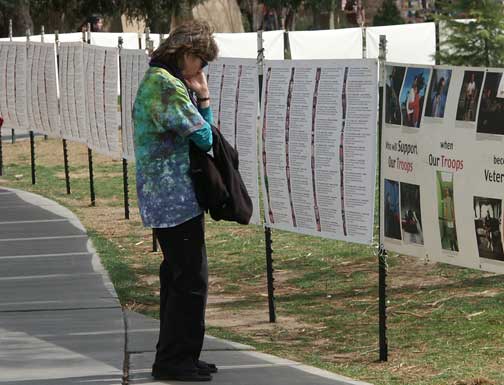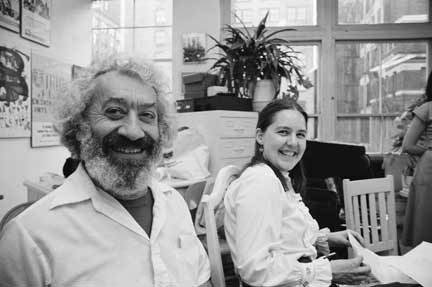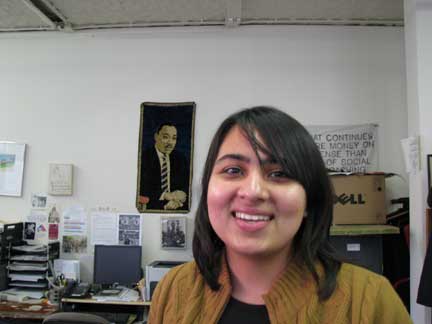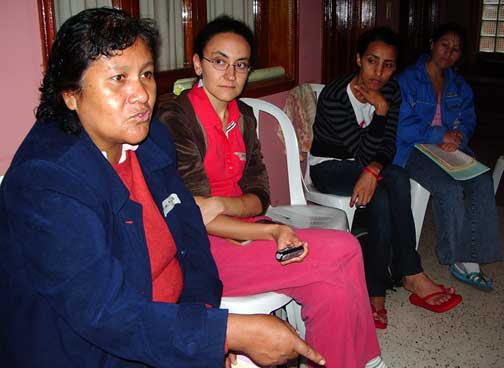
|
|
||||||||||||||
 |
A solitary moment for a viewer of The Afghanistan/Iraq Memorial Installation on the campus of the University of New Mexico as part of the annual Peace Fair held by the Peace Studies Department. Photo by Joe Mowrey |
In the Spring of 2003, Tim Origer, a disabled veteran, was attending weekly demonstrations against the invasion and occupation of Iraq held at a major intersection in Santa Fe, New Mexico. This was shortly after the infamous “Mission Accomplished” statement made by George Bush on the deck of a U.S. aircraft carrier. Someone driving by yelled at Tim, “Go home. The war is over.” In response to this kind of heckling, he conceived of a memorial to the U.S. military personnel killed in Iraq as well as in Afghanistan. Tim, a combat veteran who lost his leg to a land mine in Vietnam, feels it is important to acknowledge the ongoing senseless deaths, both military and civilian, resulting from these wars. So he created the Iraq/Afghanistan Memorial Installation, a series of three by six foot vinyl banners with the names, faces and brief biographies of U.S. military personnel killed in Iraq and Afghanistan. The Memorial also includes information about civilian deaths in both countries. The installation, which currently consists of 95 banners containing nearly 4,500 names, is now 600 feet long and is growing every month. In the last five years our group of volunteers has installed the Memorial at dozens of locations in northern New Mexico, including the University of New Mexico, the College of Santa Fe, Tewa Women United functions and the New Mexico State Capitol in Santa Fe. The banners have also been carried by marchers in demonstrations and community parades.
While those of us involved with the project make no secret of our opposition to war, the Memorial itself contains no political content. Its impact seems to transcend the politics of those who experience it. This allows us to put a human face, not only on those whose lives are being sacrificed in these tragic occupations, but also on the antiwar movement which is often characterized in a negative, “anti-American” light. Gathering the information and formatting the Memorial is often a gut-wrenching task. After two years of working on the project Tim became overwhelmed by the constant exposure to the faces and stories of the young men and women whose lives are forfeited to these ongoing occupations. At that point, I took over the research and production of the banners. It is sometimes painful work, but to look into the eyes of the casualties of war is to truly grasp the need for opposition to the folly of violence as a solution to political conflict.
There is a large veteran community in New Mexico and we experience frequent encounters with veterans returning from both Iraq and Afghanistan, many who have served more than one tour of duty. Perhaps the most powerful personal experience I have had with the Memorial was the day an Iraq veteran took down a banner and brought it to our table. He asked us to remove the banner from the display because six friends whom he had served with in Iraq were on it. He was so overcome with grief at the acknowledgment of those deaths, he could think of no other response. On another occasion, a young man discovered the name of an old childhood friend of his whom he was unaware had died in Iraq.
We hope that the Memorial will have a short lifespan. The horror of the occupations of Iraq and Afghanistan must come to an end. It is up to each of us to reach out in whatever way we can to wake people up to the senselessness of war. I will consider our project a success the day we are able to put it away permanently and devote our energies to other much-needed activities related to human rights and social justice.
—Joe Mowreyz
Ralph DiGia passed away on February 1 at the age of 93 at St. Vincent’s Hospital in New York City where he had spent several weeks struggling to recover from a broken hip. Ralph joined the War Resisters League Executive Committee in the 1940s after serving a prison term as a draft resister during World War II, then joined the WRL staff in 1955. He remained active in the League for the rest of his life. He was also a founding board member of the Muste Institute and continued to serve on the Institute’s advisory committee. An effort to describe Ralph’s incredible life would take a whole book. Instead we share with you some memories from Muste Institute board secretary Bernice Lanning and advisory committee member Albon Man.
 |
Ralph shows off his famous smile at a Muste Institute board meeting in the early 1980s with fellow board member Linnea Capps. Photo by David McReynolds |
Bernice Lanning: “I was not part of the movement yet, it was the first demonstration I was ever on, it was at the old Women’s House of Detention in Greenwich Village, and I was picketing for the first time with my friend Catherine, and I noticed that people went off the line and got coffee and came back. So I went across the street, and there at the corner of Greenwich and Christopher there was a man holding a lot of papers. When I’m nearer to him, they start to fall out of his hands, so I reach over to take some, to help him. He had the most beautiful smile anyone had ever seen. And he said, ‘give them out, give them out.’ I didn’t know what to do. I walked a few steps. And someone took one. I was leafleting. And I did all of that for the rest of my life. And it was his smile. That’s really what it was. I afterwards heard from so many people who had the same experience.”
Albon Man: “I got to know Ralph well when both of us, as nonreligious COs, were sent to the federal prison in Danbury, Connecticut, in 1943. There we went on a work strike against racial segregation in the prison mess hall. About 16 of us COs, including Ralph and me, were then put in a separate wing of the prison, where we were locked in individual solid-door cells. So we had to communicate with one another by lying on our cell floor and hollering through the cracks under our doors. I had many conversations with Ralph under those circumstances.
“After four months we won the strike and were let out into the general prison population. But not for very long. Several of us former strikers were hustled off to other federal prisons because the authorities were afraid that we would continue to make trouble at Danbury. Ralph and I were taken in a car (flanked by a couple of guards) to the federal penitentiary at Lewisburg, Pennsylvania, to spend the rest of our sentences. Ralph was a wonderful person to do prison time with. His sunny disposition kept everybody’s morale up.”
You can read more memories of Ralph in the guestbook created for him on the New York Times website at http://www.legacy.com/nytimes/GB/GuestbookView.aspx?PersonId=102483608&
You can read about the Ralph DiGia Fund, set up by Ralph's family, at http://www.ralphdigiafund.org/
Uruj Sheikh, the new Freeman intern at War Resisters League, is a student at New York City’s Pace University and a volunteer organizer with Students for a Democratic Society. She grew up in New Jersey, where she continues to live with her family. Her early activism included letter-writing campaigns and participating in the Shalom Club at the all-girl Catholic high school she attended. She later became involved in SDS and also worked on civil rights issues at the New York office of the Council on American Islamic Relations (CAIR).
 |
Photo by Jane Guskin |
Uruj was introduced to the War Resisters League by Francesca Fiorentini, who does editorial and design work at Left Turn magazine and was also on the staff of WRL. When the League organized a delegation to the US Social Forum in June 2007, Uruj went with the group and became more involved. As the newest Freeman intern at WRL’s national office, she plans to help with youth organizing and an assessment of the anti-war movement, among other projects. Her internship started in mid-January and lasts until May, though she expects to stay involved beyond that time. Uruj is especially excited about this opportunity to learn more and develop her organizing and leadership skills. She believes paid positions are important; she hopes to also help with fundraising so the League can afford to hire more staff and interns.
The Harrop A. and Ruth S. Freeman Peace Internship Endowment was created at the Muste Institute in 1996 by a bequest from lifelong peace activists Ruth and Harrop Freeman to provide stipends to interns in the War Resisters League national office. Information about how to apply to the internship program is on the WRL website at www.warresisters.org/freemaninternship.
Counter-Recruitment Grants, December 2007
The Muste Institute’s Counter Recruitment Fund supports grassroots efforts to inform young people about the realities of military service, help them protect their privacy from recruiters and refer them to non-military education and employment options. Our next grant deadline is April 11, 2008. Guidelines are at www.ajmuste.org/counter-recruit.htm
Arlington West Film and Speakers Project, Los Angeles, CA: $1,500 to screen and distribute the film “Arlington West” for students in Los Angeles area high schools, exposing them to the realities of military service. http://www.arlingtonwestfilm.com/
Chico Peace and Justice Center, Chico, CA: $500 for the Partners in Peace project, distributing informational materials to Chico and Oroville-area high school career centers and orienting guidance counselors on the use of these materials. http://chico-peace.org/
NC Choices for Youth, Carrboro, NC: $1,000 for outreach to youth in the Raleigh/Durham/Chapel Hill “triangle” area with distribution of locally-oriented materials aimed at countering specific military recruitment tactics. http://ncchoicesforyouth.org/index.htm
Peaceful Vocations, Fort Worth, TX: $1,000 for the Step It Up ’07-’08 campaign, including tabling with informational literature and a street theater project to reach youth in the Fort Worth area. http://peacefulvocations.org/
Recruiter Watch PDX, Portland, OR: $1,000 for outreach materials, exhibits and transportation for low-income youth to participate in Life After High School: Career and Educational Opportunities, a fair highlighting alternatives to military service.
Salinas Action League, Salinas, CA: $1,000 for a project providing new counter recruitment activists with organizer training manuals and informational materials to distribute to targeted youth in and around Salinas. http://www.salinasaction.org
CRITICAL RESISTANCE OAKLAND
Oakland, CA: $2,000
The Oakland chapter of Critical Resistance has fought prison and jail construction
in California since 1999. This grant goes to expand and strengthen a network
of grassroots activists and communities impacted by incarceration, to build public
opposition to California’s plan for 53,000 new prison beds. http://www.criticalresistance.org/article.php?list=type&type=15
 |
Participants at the third annual Beyond Prisons Day mobilization in March 2007. Critical Resistance Oakland helped bring together more than 400 people, most of them former prisoners and family members of prisoners, from around California to the state capital, Sacramento, to say "No!" to prison construction. Photo by Critical Resistance Oakland |
IRAQ/AFGHANISTAN MEMORIAL INSTALLATION
Santa Fe, NM: $2,000
The Iraq/Afghanistan Memorial Installation features the names, faces
and brief biographies of U.S. military personnel killed in Iraq and Afghanistan,
as well as statistics and information about civilian deaths. This grant
goes to update the memorial and transport it to additional sites for
display.
MOVING TRAIN
Burlington, VT: $2,000
Moving Train is the production company of Deb Ellis and Denis Mueller,
who produced the acclaimed 2004 documentary “Howard Zinn: You Can’t
Be Neutral on a Moving Train.” This grant goes for a new film project, “Peace
Has No Borders,” about a former U.S. soldier who went AWOL in 2005
because of concerns about the war in Iraq and now lives in Canada.
NEVADA DESERT EXPERIENCE
Las Vegas, NV: $2,000
For more than 25 years, Nevada Desert Experience has organized nonviolent
actions at the nuclear test site in Nevada to educate the public about
the dangers of nuclear weapons. This grant goes for efforts in Nevada
and New Mexico to build grassroots opposition to “Complex 2030,” a
$150 billion Department of Energy plan to ramp up nuclear weapons production,
consolidate the entire U.S. plutonium stock in one location and systematically
rebuild every weapon in the U.S. arsenal. http://www.nevadadesertexperience.org/
OLNEYVILLE NEIGHBORHOOD ASSOCIATION
Providence, RI: $2,000
Olneyville Neighborhood Association began in 1998 when residents started
meeting at a local church to address day-to-day living conditions. This
grant goes for an immigrant defense network to respond to immigration
raids, including a telephone hotline, Know Your Rights trainings, and
organizer trainings for immigrant communities around Providence.
OPPORTUNITY FUND FOR DEVELOPING COUNTRIES (OFDC)
Salt Lake City, UT: $1,000
OFDC is a grassroots volunteer organization started in 1997 to address
poverty and social injustice in developing countries. This grant goes
to educate 300women in rural areas of western Kenya near Kitale about
their property rights and to support their efforts to organize in defense
of these rights. The issue is especially important given the AIDS pandemic;
women who lose their husbands to AIDS are at risk of becoming homeless
and landless if they can’t defend their inheritance rights. http://www.ofdc.org/
OREGON PEACE INSTITUTE
Portland, OR: $2,000
The Oregon Peace Institute distributes resources for peace and nonviolent
conflict resolution. This grant goes for a speaking tour bringing Sami
Rasouli, the founder of Muslim Peacemaker Teams, from Iraq to the Pacific
Northwest in September 2008 to speak about nonviolence and the situation
in Iraq. http://www.orpeace.us/
| The A.J. Muste Memorial Institute makes small grants to groups engaged in nonviolent education and action for social justice. Our next deadline is April 11, 2008. Guidelines are at http://ajmuste.org/guidelin.htm |
The NOVA Fund has supported active nonviolence work in Latin America since 1999. The fund does not accept unsolicited proposals; grant recommendations are made by an associate of the Muste Institute with years of experience supporting Latin American nonviolence efforts.
SER PAZ, Guayaquil, Ecuador: $10,000 in July 2007 for the “Neighborhood of Peace Youth Movement,” training and educating current and former gang members in the Ecuadoran coastal city of Guayaquil to encourage and support them in nonviolent efforts for social justice. http://www.serpaz.org
SERPAJ America Latina, San José,Costa Rica: $30,450. Grants in June 2007 included $13,500 from the NOVA Fund, plus $13,000 supported by the Appleton Foundation, for coordination and support of educational work promoting active nonviolence and social justice in Latin America. In September, the NOVA Fund granted $3,950 to pay travel costs for four SERPAJ activists to participate in a meeting on “Human Rights and Free Trade Treaties” held in Costa Rica September 23-27, 2007. SERPAJ founder Adolfo Pérez Esquivel and activist-singer Sara Mamani came from SERPAJ Argentina in Buenos Aires; Blas Garcia Noriega of the recently formed Grupo Pro Serpaj-Colombia flew in from Barranquilla, on Colombia’s Caribbean coast; and Efrén Hernández Maldonado, a Chontal indigenous activist, came to the meeting from Villahermosa, Tabasco, Mexico. http://www.serpajamericalatina.org/
SERPAJ Costa Rica, San José, Costa Rica: $6,385 in October 2007 to purchase computer equipment and carry out educational and organizing work toward creating a culture of peace and promoting the defense of people’s human, civic, social, economic and cultural rights in Costa Rica. http://www.serpajamericalatina.org/secretariados/secretariadocostarica.htm
SERPAJ Morelos, Cuernavaca, Morelos, Mexico: $17,875.Grants in June 2007 included $6,000 from the NOVA Fund, plus $10,000 supported by the Appleton Foundation, for the SERPAJ-Morelos “Think Out Loud” Gandhian Collective’s research and education work on social conflict and nonviolence in Mexico and its efforts to support active nonviolence, peace-building and autonomy. In November, the NOVA Fund granted $1,875 for two activists from SERPAJ Morelos to travel to the International Congress on Peace and Nonviolence held January 29-30 in India.
In addition, four more grants were made in August with the support of the Santa Cruz, California-based Appleton Foundation:
Asociación Social y Cultural para la Integración de la Raza Negra en el Ecuador (ASCIRNE), Quito, Ecuador: $4,000 for efforts to integrate the African-descended people of Ecuador into Ecuadoran society through programs that encourage them to revalue their culture and to learn about and defend their rights. ASCIRNE was founded in 1988.
FRENAPI, San José, Costa Rica: $20,000 to the National Front of Indigenous Peoples, founded in 2003, to develop and strengthen capacity and leadership among the indigenous peoples of Costa Rica.
Grito de los Excluidos y Excluidas Mesoamericano, San José, Costa Rica: $4,000 for the “Cry of the Excluded” movement, started in 1995, to strengthen coordination and support of grassroots organizations and social movements in Mesoamerica in order to work more effectively against all forms of social exclusion.
Servicios y Asesoría para la Paz, A.C. (SERAPAZ), Mexico City, Mexico: $21,000 to the Advisory Service for Peace to strengthen nonviolent social movements and promote the transformation of conflicts in Mexico. http://www.serapaz.org.mx/
NOVA Travel Grants, October and December 2007
The NOVA Travel Fund helps grassroots activists from Latin American, Caribbean and indigenous North American organizations to participate in regional meetings.
In October 2007, the NOVA Travel Fund made four grants, totaling $4,800:
Asociación de Trabajadoras Despertando a un Nuevo Amanecer (ATDANA), Trujillo, La Libertad, Peru: $1,000 for ATDANA president Gladys Gloria Campos Chirado and organizational secretary Sonia Otiniano de Sánchez to participate in the Summit for the Friendship and Integration of the Iberoamerican Peoples, held November 7-10, 2007, in Santiago, Chile.
Fundación PLURALES, Córdoba, Argentina: $1,500 for a group of 10 rural women from Córdoba province to participate in the Meeting of Women with a Gender Perspective of the Network of Small- and Medium-Scale Producers of the American Chaco region, held December 14-17, 2007, in Yacuiba, Gran Chaco, Tarija, Bolivia.
 |
Workshop participants share their experiences at the women's meeting of the Network of Small- and Medium-Scale Producers of the Chaco region (RPMPCH) in December 2007 in Yacuiba, Bolivia. At left, activist Primitiva Martinez of the Yacuiba-based group AMUPEI (Women for Equality) tells how indigenous peasant women in Bolivia have organized themselves, while three activists from the Argentine delegation, sponsored by Fundación PLURALES, listen intently. Photo by Maria Eva Salazar |
Federación Nacional de Mujeres con Discapacidad de Perú, Lima, Peru: $800 for Lucy Deifilia Muñante Valdez, vice president of FENAMUDIP, the Peruvian National Federation of Women with Disabilities, to participate in the First Regional Meeting of Women with Disabilities for the Strengthening and Establishment of Networks, held November 22-26, 2007, in Santo Domingo, Dominican Republic.
Centro de Derechos Humanos “Juan Gerardi”, Torreón, Coahuila, Mexico: $1,500 for 45 community activists from Coahuila state in northern Mexico to participate in the 18th National Meeting of Christian Base Communities, scheduled for February 26 through March 1, 2008, in Coatzacoalcos, in the southeastern state of Veracruz.
In December 2007, the NOVA Travel Fund made 11 grants, totaling $8,680. These included $1,400 to the Parroquia de San Francisco Javier in Cerocahui, Chihuahua, Mexico for 46 activists from the northern Mexican state of Chihuahua to participate in the same National Meeting of Christian Base Communities mentioned above.
Another 10 grants in December went to groups from Colombia, Chile and Peru to participate in the First World Congress of Waste Recyclers and Third Meeting of Latin American Recyclers, held March 1-4, 2008 in Bogotá, Colombia:
Asociacion Nacional de Recicladores - A.N.R., Bogotá, Colombia: $800 for six members of a regional association of recycling collectors from Colombia’s northern coast to travel to Bogotá.
Agrupación Recolectores Ecológicos Independientes La Serena, La Serena, Chile: $1,400 for recycling collectors Marisol Huerta Rivera and Luis Humberto Flores Campos to attend the meeting.
Centro Laboral de Acción y Desarrollo Social Recolectores de Peñalolén, Santiago, Chile: $1,300 for recycling collectors Juan Enrique Valenzuela Madariaga and Isolda del Transito Yañez Carrasco to get to the meeting.
Centro Educativo, Ambiental y Cultural Lideres Sin Fronteras, Concepción, Chile: $780 for the participation of Salvador Valdivia, president of the Union of Recycling Collectors of Concepción.
Asociación de Tricicleros Unidos Región Callao - ATURCA, Callao, Peru: $500 for the participation of ATURCA president Walter Vidal Correa Mitman.
Chimbote Puerto Saludable, Chimbote, Ancash, Peru: $500 for the participation of activist and recycling collector María Mendoza Abad.
Asociación de Recicladores del Damero de Gamarra, La Victoria, Lima, Peru: $500 for the participation of Marisol Puma Rocca, president of the Damero de Gamarra association of recycling collectors.
Fuerza Emprendedora de Lima Norte, Comas, Lima, Peru: $500 for the participation of Esperanza Huanca Arce, president of Fuerza Emprendedora, a group of recycling collectors.
Servicios Multiples de Residuos Sólidos de Pucallpa, Pucallpa, Peru: $500 for the participation of Mercy Luz Silvano Pangosa, a recycling collector and leader of an enterprise controlled by organized recycling collectors.
Asociación Las Aguilas del Tercer Sector de Villa El Salvador, Villa El Salvador, Lima, Peru: $500 for the participation of recycling collector César Delgado Carbajal.
Total October-December 2007: 15 grants, $13,480
Deadlines for the NOVA Travel Fund are every two months: February 1,
April
1, June 1, August 1, October 1 and December 1. Guidelines are in Spanish
at http://ajmuste.org/novaintro.html. The
full roster of NOVA Travel grants from calendar year 2007 is at http://ajmuste.org/viajes2007.htm